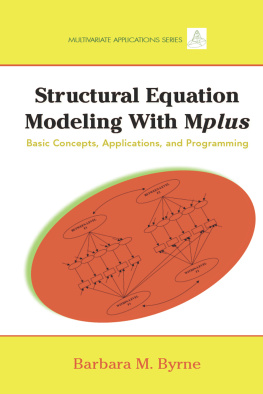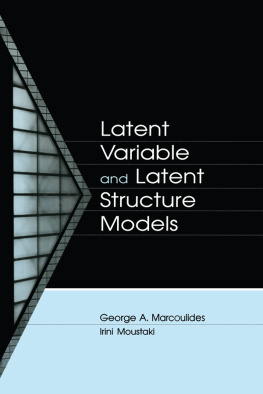Current Topics in the
Theory and Application
of Latent Variable
Models
This book presents recent developments in the theory and application of latent variable models (LVMs) by some of the most prominent researchers in the field. Topics covered involve a range of LVM frameworks including item response theory, structural equation modeling, factor analysis, and latent curve modeling, as well as various non-standard data structures and innovative applications.
The book is divided into two sections, although several chapters cross these content boundaries. of the book focuses on drawing real-world meaning from results obtained in LVMs. In this section there are chapters examining issues involving assessment of model fit, the nature of uncertainty in parameter estimates, inferences, and the nature of latent variables and individual differences.
This book appeals to researchers and graduate students interested in the theory and application of latent variable models. As such it serves as a supplementary reading in graduate level courses on latent variable models. Prerequisites include basic knowledge of latent variable models.
Michael C. Edwards is an Associate Professor in the Quantitative Area of the Department of Psychology at The Ohio State University.
Robert C. MacCallum is Professor Emeritus of Psychology at both the University of North Carolina at Chapel Hill and The Ohio State University.
Current Topics
in the Theory and
Application of Latent
Variable Models
Edited by
Michael C. Edwards
The Ohio State University
and
Robert C. MacCallum
The University of North Carolina at Chapel Hill

First published 2013
by Routledge
711 Third Avenue, New York, NY 10017
Simultaneously published in the UK
by Routledge
27 Church Road, Hove, East Sussex BN3 2FA
Routledge is an imprint of the Taylor & Francis Group, an informa business
2013 Psychology Press
The right of the editors to be identified as the authors of the editorial material, and of the authors for their individual chapters, has been asserted in accordance with sections 77 and 78 of the Copyright, Designs and Patents Act 1988.
All rights reserved. No part of this book may be reprinted or reproduced or utilised in any form or by any electronic, mechanical, or other means, now known or hereafter invented, including photocopying and recording, or in any information storage or retrieval system, without permission in writing from the publishers.
Trademark notice: Product or corporate names may be trademarks or registered trademarks, and are used only for identification and explanation without intent to infringe.
Library of Congress Cataloging-in-Publication Data Current topics in the theory and application of latent variable models / edited by Michael C. Edwards and Robert C.
MacCallum.
p. cm.
1. Latent structure analysis. 2. Latent variables. I. Edwards,
Michael C. (Michael Charles), 1977- II. MacCallum, Robert C.
QA278.6.C87 2013
519.35-dc23
2012017548
ISBN: 978-1-84872-951-3 (hbk)
ISBN: 978-0-415-63778-7 (pbk)
ISBN: 978-0-203-81340-9 (ebk)
Typeset in Times New Roman
by Cenveo Publisher Services
Contents
PART 1:
Complexities in Latent Variable Modeling
CHAPTER 3 DERIVING ESTIMATORS AND THEIR STANDARD ERRORS IN DYADIC DATA ANALYSIS: EXAMPLES USING A SYMBOLIC COMPUTATION PROGRAM
CHAPTER 8 NONPARAMETRIC BAYESIAN MODELING OF ITEM RESPONSE CURVES WITH A THREE-PARAMETER LOGISTIC PRIOR MEAN
PART 2:
Drawing Meaning from Latent Variable Models
CHAPTER 15 ON THE EQUILIBRIUM DYNAMICS OF MEANING
Foreword
I have lived long enough that I was privileged to know many of the revered stalwarts of quantitative psychology and, when a graduate student, was fortunate to have taken classes with several of them (R. E. Bargmann, R. B. Cattell, L. J. Cronbach, L. G. Humphreys, H. F. Kaiser, L. R Tucker). Another quantitative psychologist, however, one much nearer my own age, remains one of my favorite QPIHKPs (quantitative psychologists I have known personally). He is Michael W. Browne, the honoree of this volume. I was well aware of Michael Browne's work and reputation before I first met him in 1972 at the University of Pennsylvania, where we were attending a workshop on multidimensional scaling sponsored by Bell Labs and the University of Pennsylvania. We became acquainted both during that workshop's scheduled events, which included a "rip-roaring" evening talk by Warren G. Torgerson, and at an informal dinner at a middle-Eastern restaurant in Philadelphia featuring an attractive belly-dancer. The food was not memorable; the dancer, however, was.
That Michael Browne was truly good, to use an adjective that was common then to characterize someone who was clearly rising to the top of his or her field, was obvious from the outset. Had I been more prescient, I would have realized that he was to become one of the very best ever in the quantitative modeling of multivariate data. As readers of this volume will soon learn, Michael's contributions to estimation, model fitting and evaluation, factor analysis, time series modeling, etc., have been extremely influential for the past four decades and will remain so, for the foreseeable future.
But I saw later in other venues, such as meetings of the Society of Multivariate Experimental Psychology, that there was much more to Michael Browne than supreme expertise in statistics and modeling. Michael possessed a precision of thinking, a dignity, an integrity, and a sense of fair play that has been all too rare in my time. His standards of professional ethics and behavior are impeccablewe would all do well to emulate them.
Michael's influence on my own thinking has been tremendous. When he spent a sabbatical quarter at the University of Virginia in 1999 I daresay that I benefitted more from his company than anyone. Michael and I had the opportunity to become much better acquainted through direct intellectual exchange, and did so in numerous discussions and friendly arguments over lunches, dinners, and not a few evening libations of a certain kind of tea that, while approximately the right color, was served over ice cubes and tasted remarkably like Jack Daniels.
During the past decade, Michael Browne and I have worked together on a number of research papers, and that collaboration has been a career highlight for me. I am proud that we have emphasized a focus on the individual as the unit of analysis in behavioral research, and on the study of process and change rather than static attributes. We have enthusiastically promoted multivariate measurement applied on many successive occasions as a path for realizing these emphases. In turn, this emphasis has fostered the role of Cattell's P-technique factor analysis as much more than a covariation technique but, rather, as a way of thinking about empirical research on behavior. This effort has been helped immeasurably by capitalizing on Michael Browne's expertise in time series modeling. In the process, we have stood shoulder- to-shoulder to question some venerated traditions and blindly adhered-to dogma of our field, and have suggested some alternatives to the dominant practices of today that seem to us to warrant reconsideration. After several unsuccessful tussles with leading quantitative psychology journals regarding these matters, we remain bloody but unbowed and continue to push for broadening perspectives on key matters having to do with measurement and modeling.










